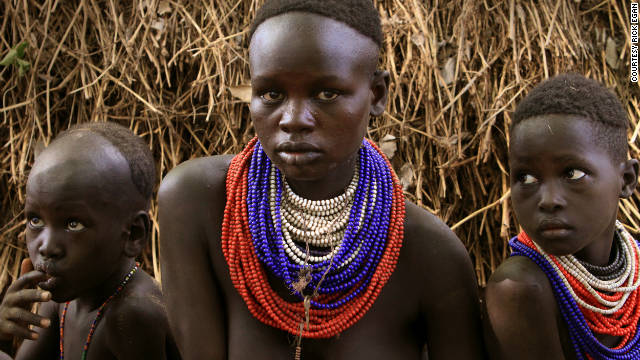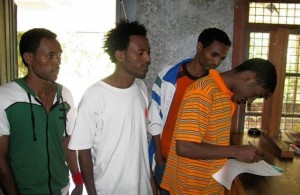Can you start by telling me when and where you served?
I served about a year in Germany. Then, I did almost a year in Iraq. I was in Baghdad from 2003 to 2004. I got wounded, went back to Germany, did some therapy and came back home.
How did you and your family come to the United States?
My parents fled a war-torn country, Ethiopia, both my mom and dad, and they both have an amazing story. My mom has told me what they endured. They fled to Sudan in the ’70s, they settled in a refugee camp and that’s when they had me and my brothers and sisters. I lived in Sudan until I was about 9. In 1992, my father brought us here. He actually came here ahead of us.
We moved into the suburbs of Chicago. I remember landing at O’Hare airport when I saw my dad, ran up to him, hugged him. And, he said, “The car is in the garage. I’ll go get it.” He came and picked us up. Now, coming from a poor country, I didn’t think much of it, but when I saw the car I’m like, “Wow, my dad got a four-door car.” Obviously, it was a used car. [LAUGHS] It was a little beater, but I didn’t know that.
We pull up to the apartment building. I’m just fascinated. You’re seeing this nice, fancy-looking building — which wasn’t — but at the time to me it was. We walked into the two-bedroom apartment. There’s six of us including my mom and dad. And he said, “This is where you guys are going to sleep.” There’s two beds, single beds. I was excited. Back in Sudan, there was four of us sleeping on one bed with no mattress, just on the springs, but sometimes, you’re sleeping on the floor. And, to me, this is wild.
Is the tide turning against the killing of ‘cursed’ infants in Ethiopia?

Some who have left the village to attend school have come back to try to combat the mingi killings, offering plans to send the mingi children far away from the tribe instead of death. A child can be mingi because of physical deformities, illegitimate birth or superstitions. (CNN)
By Matthew D. LaPlante
His top teeth came in before his bottom teeth. That is how elders of the Kara tribe determined that a healthy baby boy needed to be killed.
The child was “mingi” — cursed, according to their ancient superstitions. With every breath, they believed, the boy was beckoning an evil spirit into their village.
Murderous though it was, the decision to kill the boy was the easy part. It was the sacrifice of one infant for the good of the entire tribe — a rite that some of the elders had witnessed hundreds of times throughout their lives in Ethiopia’s remote Omo River Valley.
The tribe’s leaders were less certain of what they should do about the boy’s twin brother, who had died of sickness shortly after birth. After some debate, including a pensive examination of a goat’s intestines, they decided the dead child must have been mingi, too.
So they dug up the corpse, bound it to the living boy, paddled a canoe into the center of the Omo River and threw them both into the murky brown water.
That was five years ago — a time before many outside of this isolated basin had ever heard of mingi.
Today, nudged out of acquiescence by a slow-growing global condemnation of the ritualistic infanticide practiced by the Kara, Banna and Hamar tribes of southern Ethiopia, regional government officials have begun to take action — threatening prison for those complicit in mingi killings.
Playing the U.S. Visa Lottery in Ethiopia
BY Miriam Jordan
Photo: 19-year-old Brhanu Arezaynie (right) with DV lottery form at Addis Ababa university’s post office. According to the U.S. State Department, 785,318 Ethiopians and their dependents submitted entries last year and at least as many are anticipated this year. (Miriam Jordan/The Wall Street Journal)
—
ADDIS ABABA— The line of Ethiopians extended out the door on a recent afternoon at the normally sleepy Addis Ababa University post office, where the lone clerk wasn’t selling stamps or weighing packages. She was dispensing a coveted lottery ticket—a shot at legal residence in the U.S.
While the U.S. Postal Service strives to develop nonmail ventures to keep it afloat, its Ethiopian counterpart has found a novel side business, mining dreams of America.
The U.S. government issues green cards to 50,000 people world-wide each year by sheer luck of the draw. Nationals from countries that have sent few immigrants to the U.S., such as Ethiopia, are eligible to participate in the program, known as the Diversity Visa Lottery. Saturday marks the end of this year’s 30-day entry period, during which millions across the globe rushed for a chance to win a green card.
In Ethiopia, where the lottery is mainly known as “DV” and Internet penetration is minuscule, the online-only entry process has generated a burst of business. Internet cafes have profited, and so has the Ethiopian Postal Service, which collects a service fee starting at 10 Ethiopian birr, or 57 cents, for each online entry it processes.
Read more at the Wall Street Journal.
—–
Related:
How Does the Green Card Lottery Work?
By: Jaceson Maughan
The Diversity Immigrant Visa Program, better known as the green card lottery, is a system by which immigrants achieve the status of a Lawful Permanent Resident. The lottery is conducted by the US State Department and is held each year for two months. It determines who, of thousands of applicants, will earn a green card that allows them to live and work in the United States.
Why is there a green card lottery?
The green card lottery is regulated under the Immigration and Nationality Act (INA), sections 203c and 131. It is geared to enable people to immigrate to the United States from countries that don’t have high immigration rates. More than 80 percent of the visas awarded through the lottery go to African and European countries. An immigrant must be family-sponsored, employment sponsored or a relative of a US citizen.
How can I participate in the lottery?
The green card lottery makes available 50,000 green cards. Applicants have gone through plenty of paperwork to be qualified for the lottery. Eligibility requirements include proof of the country of origin, proof of a high school education or equivalent or proof of the country of origin of a spouse, meaning you are married to someone eligible for the lottery. There are certain countries whose residents are restricted from entering the lottery; if more than the required number of immigrants from a certain country are granted over five years, that country is put on the ineligible list, and no more immigrants from there can apply until the country is eligible again.
A lottery application must be filled out in English and contain copies of all the relevant information regarding proof of claims, including a photograph. If someone wishes to include their family members on the application, it must contain passport-style photos of each person.
What happens if I am chosen?
Once the 50,000 applicants are selected, the applicants are required to submit even more paperwork. Once the paperwork is reviewed, the applicant will be invited to a series of interviews at either a US consulate in their native country or at a United States Citizenship and Immigration Services office (USCIS).
What about companies that offer to help me?
There are several organizations that claim to facilitate an applicant’s status in the lottery. These groups are not official government entities and there have been reports of fraud and deception on a widespread scale. The State Department has a special section that outlines the practices of such organizations and lists several warnings that applicants can heed.
Source: www.life123.com.


One thought on “Meet Iraq War Veteran Yonas Hagos”
Comments are closed.